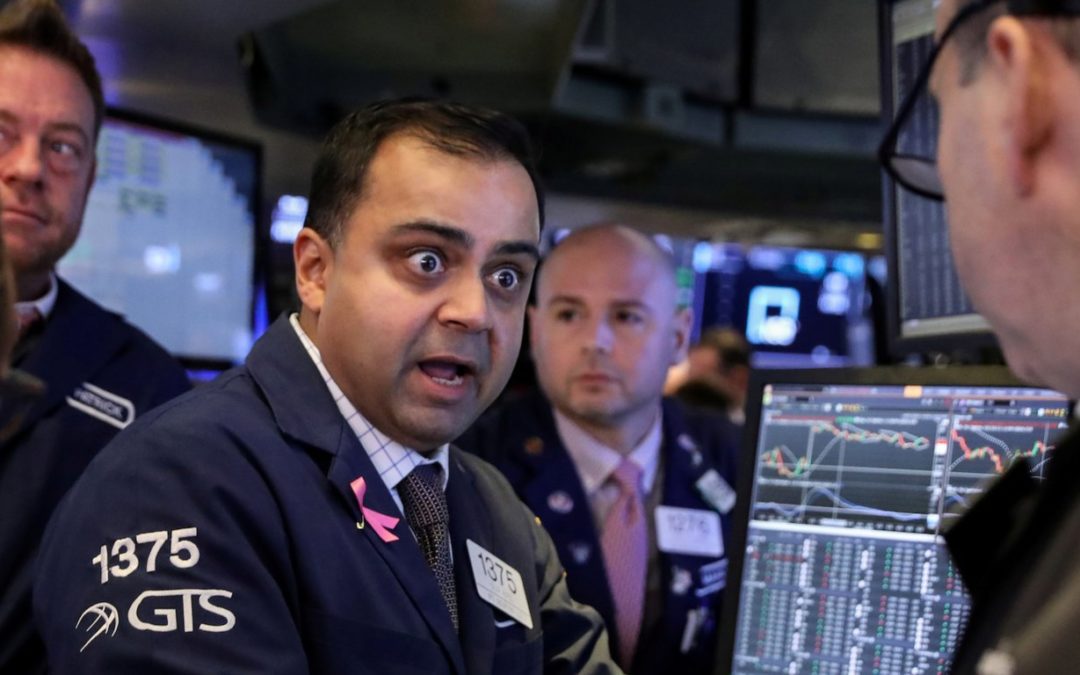Whether President Donald Trump‘s newly ignited trade war with China has accomplished anything to date is still up for debate. But what it has definitively done is reintroduce volatility to the stock market.
After climbing to a fresh all-time high at the end of April, US equities have been whipsawed by trade-war developments — many of them coming straight from Trump’s notorious Twitter account.
The week ended May 10 proved to be the worst of 2019 so far. Then, this past week, the benchmark S&P 500 dropped 2.4% on Monday before spending the next four days struggling to claw back into the green.
It’s been a roller coaster ride to say the least. And some experts across Wall Street think the market has been destabilized to the point where an external shock could fly in and wreak havoc.
Vincent Deluard, a macro strategist at INTL FCStone, counts himself among this contingency. He sees the bullish stock-market arguments being floated by certain pundits, and he thinks they’re grossly exaggerated.
He doesn’t think there’s a method to Trump’s negotiating madness, like many optimists do. He doesn’t believe that the Federal Reserve will continue to backstop the market, because he doesn’t buy into the idea that inflation will stay low forever. And he definitely doesn’t see corporate earnings growing to the degree many do. He says margin expectations are just too far-fetched.
So where does that leave an equity market that’s proven itself highly susceptible to sudden shifts in the investing landscape? Deluard says stocks could be at the precipice of a more than 20% decline from recent record highs.
“It is not difficult to envision a scenario where this Twitter tantrum turns into a fully-fledged bear market,” Deluard said in a recent client note, in reference to Trump’s recent weakening of equity sentiment.
But in order for that to happen, he says the trade-war-weakened equity environment will have to get rocked by some sort of exogenous shock. Or, as Deluard refers to them, “black swan” events. The name of his recent research report is even “A Wedge of Black Swans.”
After all, the trade war alone hasn’t been enough to derail the more than 10-year bull market. Deluard argues that it needs to be coupled with something relatively catastrophic.
Deluard narrows these tail-risk events down to three distinct scenarios:
(1) “Bubbly” private markets reprice lower after the recent market struggles of Uber and Lyft
In this scenario, Deluard envisions the overall decline of risk appetite in the public market as a result of lower private-market valuations. He cites Uber‘s roughly 20% loss since going public, and Lyft‘s even steeper 35% sell-off.
“Valuations will need to be dropped,” Deluard said. “Capital raises will slow. Investors who financed rounds at absurd multiples will need to write down t heir stakes. Option packages will lose value. Employees may leave.”
He continued: “Skeletons may come out of the closet of many a once-highly valued tech unicorn.”
(2) Venezuela or Iran cause a shock in global oil prices
When it comes to the oil market, Venezuela and Iran are the two nations with the most ability to cause trouble. Deluard notes that 20% of global oil consumption crosses the Iran-adjacent straits of Hormuz every day. And, with a whopping 297 billion barrels, Venezuela has the world’s largest proven oil reserve.
But oil wouldn’t directly hurt the stock market to the degree Deluard envisions. He thinks the real damage will come if an oil shock driven by geopolitics keeps the Fed from being able to tweak monetary policy like it wants.
“Despite the current euphoria about ‘the death of inflation’ and the ‘goldilocks economy,’ it is still possible for the Federal Reserve to find itself in the 1970s dilemma: accelerating inflation and a slowing economy,” Deluard said.
(3) There’s a “leftist takeover” of the Democratic party ahead of the 2020 presidential election
Deluard sees a potential scenario where parts of Sen. Bernie Sanders‘ leftist political plan from the 2016 election cycle find their way onto the platform for almost every Democratic candidate.
“The demographic turning from boomers to millennials and Gen Z will lead to greater demand for redistributionist and inflationary policies in the 2020 election.”
Such a situation would almost certainly put pressure on stocks.
With all of that established, Deluard isn’t saying that any of these three situations are certain to unfold in the next 12 months. He just thinks they have a higher likelihood of transpiring than the perfect storm required for continued gains.
He leaves his readers with one final warning: “Buy the dip at your own risk.”
